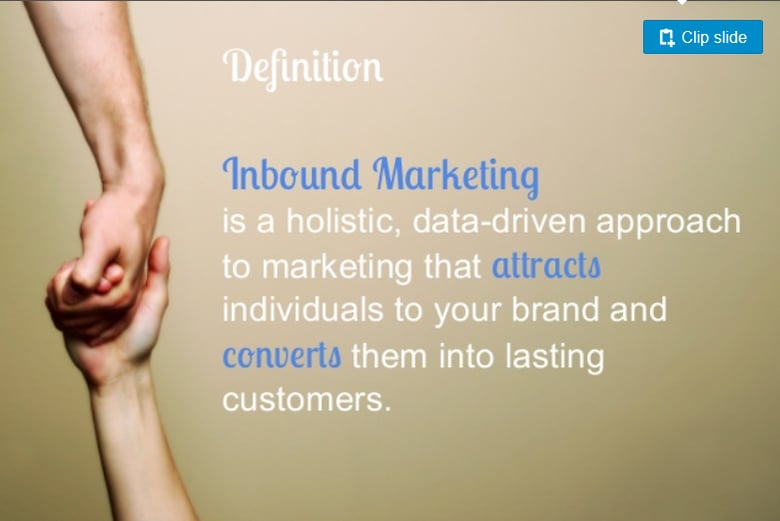Inbound marketing is an approach to marketing that both amplifies your sales people, and speaks to consumers where and how they shop. We dig into what it is, and whether it’s right for you, in this post.
Take your very best salesperson and put them across the table from a well-qualified potential client. Get this sales person to understand your customers’ problems, in-depth, and then explain to them how your product or service can help solve that problem.
Sounds like the job of a salesperson rather than a marketer, doesn’t it? It’s not.
This is how I like to think of Inbound Marketing: “We try to amplify your top salesperson’s performance – in the digital world.”
DEFINING ‘INBOUND MARKETING’
HubSpot, the company that turned Inbound marketing into a worldwide movement, defines it like this: “Inbound Marketing is a holistic, data-driven approach to marketing that attracts individuals to your brand and converts them into lasting customers.” (You can find out more about it from HubSpot’s helpful Slideshare presentation here).

IS INBOUND FOR ME?
Inbound marketing isn’t right for everyone. If you’re selling hamburgers from a kiosk, there are probably better ways of attracting new clients (like giving them samples of your special sauce). If so, inbound marketing is not for you. To benefit from inbound marketing you need to be selling a complex solution that might take a while for people to research and be sure that they are making the right choice. This is known as a ‘highly-considered’ decision, in other words – an instance where people know they have a problem, but they don’t necessarily know what the solution is, or it requires a bit more than a snap judgement to choose who they want to work with.
Most business-to-business (B2B) companies can benefit from inbound marketing and so can many companies that sell consumer products (B2C) where the decision-making time is a bit longer or the price is higher.
WHAT ARE THE BASICS OF GETTING IT RIGHT?
Once you’ve decided that you’d like to use an inbound marketing approach, you need to know the following:
- Who you’re selling to (your target audience)
- What they’re buying from you and how long it might take them (the buyer’s journey)
- What makes them tick (the persona) and
- What their challenges are that you can help solve.
IS INBOUND MARKETING A SUBSTITUTE FOR SALES?
The short answer is ‘No’. Inbound marketing is not a substitute for sales, it’s an enhancement. It’s also not a substitute for other types of marketing – it’s a mechanism to measure and improve your overall marketing effectiveness. Inbound marketing can (and should) be used in combination with other paid marketing tactics – including things like paid search, radio and print advertising and activations such as on-the-ground events. But it’s one of the best ways of combining all your marketing tactics into one powerful tool that gives you full visibility, insight and control of your marketing spend – as well as its results.
ARE YOU READY FOR INBOUND MARKETING? 5 WAYS TO CHECK
Ask yourself these four questions. If you answer yes to all, or most of them, then you’re ready for inbound marketing. If not, keep reading our blog posts because you will be… soon.
- Do you love the idea of bringing leads to your business who are empowered to buy and receptive to what you have to offer?
- Are you nervous about the future of marketing and sales and how the internet is changing the landscape
- Are you curious about how to make it work?
- Is your company flexible, willing to change, willing to test and do you have the desire to improve?
- Do you feel a rapport with the marketing agency who you plan to work with?
It’s important for clients to be aware of the challenges that they’re facing before they can benefit from inbound marketing. They usually come to us when they’re aware that what they’re doing isn’t as effective as it once was – or they aren’t sure how effective it is.
You need to be flexible, willing to change, willing to test, and have the desire to improve. You also need to have a sense of curiosity and the willingness to test things, so you can make small improvements regularly.
It’s also important to feel a connection, or know that you have a rapport, with the inbound marketing agency who will work to help win those deals.
If you’re not yet sure whether inbound marketing is right for you and want to know more, get hold of us.
We’d love to help you choose an approach that works for you, when you’re ready.
